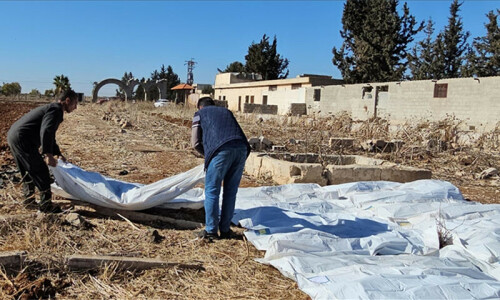ADDIS ABABA: Ethiopia will start generating power from its mega-dam on the Blue Nile on Sunday, government officials told AFP, a major milestone for the controversial project.
The Grand Ethiopian Renaissance Dam (GERD), set to be the largest hydroelectric scheme in Africa, has been at the centre of a regional dispute ever since Ethiopia broke ground there in 2011.
“Tomorrow will be the first energy generation of the dam,” an Ethiopian government official said on Saturday.
A second official confirmed the information. Both spoke on condition of anonymity because the development has not been officially announced.
Ethiopia’s downstream neighbours Egypt and Sudan view the dam as a threat because of their dependence on Nile waters, while Addis Ababa deems it essential for its electrification and development.
There was no immediate response from Cairo or Khartoum, which have been pressing Ethiopia to sign a binding agreement on the filling and operation of the dam ever since work first started.
The three governments have held multiple rounds of talks, but so far there has been no sign of any breakthrough.
The $4.2 billion project is ultimately expected to produce more than 5,000 megawatts of electricity, more than doubling Ethiopia’s electricity output.
Ethiopia had initially planned output of around 6,500MW, but later reduced its target.
“The newly generated electricity from the GERD could help revive an economy that has been devastated by the combined forces of a deadly war, rising fuel prices and the Covid-19 pandemic,” said Addisu Lashitew of the Brookings Institution in Washington.
The 145-metre high dam lies on Blue Nile River in the Benishangul-Gumuz region of western Ethiopia, not far from the border with Sudan.
Egypt, which depends on the Nile for about 97 per cent of its irrigation and drinking water, sees the dam as an existential threat.
Sudan hopes the project will regulate annual flooding, but fears its own dams could be harmed without agreement on the GERD’s operation.
Talks sponsored by the African Union (AU) have failed to yield a three-way agreement on the dam’s filling and operations, and Cairo and Khartoum have demanded Addis Ababa cease filling the massive reservoir until such a deal is reached.
But Ethiopian officials have argued that filling is a natural part of the dam’s construction process and cannot be stopped.
The UN Security Council met last July to discuss the project, although Ethiopia later slammed the session as an “unhelpful” distraction from the AU-led process.
In September, the Security Council adopted a statement encouraging Egypt, Ethiopia and Sudan to resume negotiations under AU auspices.
Egypt claims a historic right to the Nile dating from a 1929 treaty that gave it veto power over construction of projects along the river. A 1959 treaty boosted Egypt’s allocation to around 66pc of the river’s flow, with 22pc for Sudan. Yet Ethiopia was not party to those treaties and does not see them as valid.
The process of filling the GERD’s vast reservoir began in 2020, with Ethiopia announcing in July of that year it had hit its target of 4.9 billion cubic metres.
The reservoir’s total capacity is 74 billion cubic metres, and the target for 2021 was to add 13.5 million.
Published in Dawn, February 20th, 2022















































